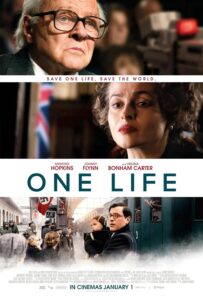
One Life
1938. On the eve of the Second World War, Nicholas Winton, Londoner, 29 years old, stockbroker, sensing the threat of the invasion of Hitler’s Germany, organized a rescue plan, known as “Operation Kindertransport” for hundreds of children, many of religious origin Jewish, before the start of the conflict. Thanks to Martin Blake, who had asked him to go to Prague to help him coordinate the operations of the British Committee for Refugees from Czechoslovakia and other central figures such as Doreen Warriner and his mother Babette who in the meantime collaborated from London, Winton managed to get the eight trains carrying hundreds of children reach Great Britain where they are hosted by foster families. A ninth was planned, but on the day he was supposed to leave, September 1, 1939, Hitler invaded Poland and the borders in Europe were closed. In the second half of the 1980s, Winton’s commitment was finally publicly recognized when he had the opportunity to meet those now adult children during the BBC program That’s Life!. In the end he saved 669 from the concentration camps and will be referred to as the “British Schindler”.
A briefcase, the pages of a diary with photos and newspaper clippings. The final ones remained white. History in One Life is rewritten from there.
Just like in Spielberg’s Schindler’s List, there is a list of names to save. And as in that film, even in this case the faces remain immediately imprinted, from the children in the refugee camp in Czechoslovakia under the snow who ask Nicholas for chocolate to the twelve-year-old who brings with her a newborn baby, to the parents who are forced to separate from their their children.
The foreground in One Life has a disruptive expressive force precisely because it contains the story of each of the characters. James Hawes is making his first feature film for the cinema but it seems that he has already shot ten after having already shown his abilities for about thirty years as a solid television director (of which we must remember, for example, five direct episodes of Doctor Who, two of Black Mirror, three of Snowpiercer and six of Slow Horses) has an incredible mastery of the lucidity in which he tells the story of Nicholas Winton but at the same time manages to excite in the simplest and most immediate way possible.








